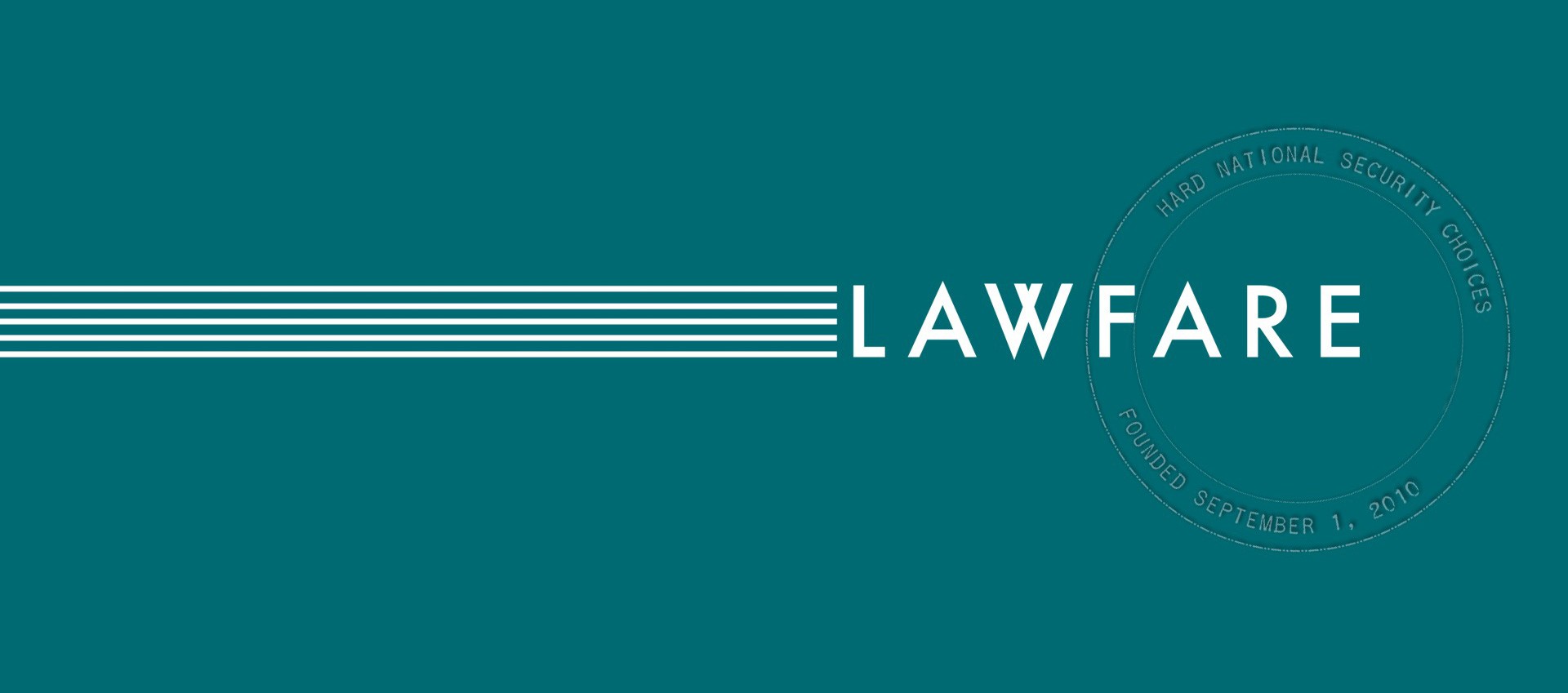The Week That Was: All of Lawfare in One Post
Your weekly summary of everything on the site.

Roger Parloff reported from the Alto Lee Adams, Sr. U.S. Courthouse in Fort Pierce, Florida, where Judge Aileen Cannon heard argument on former President Donald Trump’s motions to dismiss in the Mar-a-Lago classified documents case on March 14.
Trevor Morrison evaluated both Trump’s and the government’s presidential immunity arguments in Trump v. United States—the case regarding the former president’s alleged attempts to subvert the 2020 election. Morrison explained why presidents are neither “never immune” nor “always immune” from criminal prosecution.
On the Lawfare Podcast, Benjamin Wittes sat down with Anna Bower and Andrew Fleischman to discuss Judge Scott McAfee’s opinion that allows District Attorney Fani Willis to stay on the 2020 Georgia election interference case if her former boyfriend and special prosecutor Nathan Wade steps aside. They talked about what Judge McAfee did in his opinion, whether there is a serious prospect for a successful appeal, and more:
On March 21, Quinta Jurecic sat down with Wittes and Parloff for this week’s episode of “Lawfare Live: Trump’s Trials and Tribulations.” If you could not attend the live event, the recording is on Lawfare’s YouTube channel or over the weekend on the Lawfare Podcast feed:
On March 14, Lawfare launched a new page where you can find all of our coverage of the New York criminal trial against Trump relating to alleged hush money payments made during and after the 2016 election.
On Rational Security, Alan Z. Rozenshtein and Jurecic were joined by Tyler McBrien and Bower to talk through the week’s big national security news, including the resignation of Wade after the discovery of his personal relationship with Willis, the Supreme Court’s “chilly reception” to oral argument in Murthy v. Missouri, the alleged CIA influence operation during the Trump administration on Chinese social media to spread negative information about Xi Jinping and others, and more:
Kamya Yadav and Samantha Lai considered the term “information integrity” and how it can be adapted and used by policymakers to ensure the security of an open information ecosystem within a democracy.
Scott R. Anderson explained how Section 1250A, the new provision in the National Defense Authorization Act that prohibits the president from unilaterally withdrawing from the North Atlantic Treaty Organization, is incomplete. He argued that mechanisms like pre-authorized litigation should be implemented to allow challenges to any president who tries to violate the provision.
Preston Marquis analyzed the Security and Freedom Enhancement Act of 2024 (SAFE Act), a new, bipartisan bill that seeks to find “middle ground” on the warrant requirement and the expansion of the reverse targeting prohibition in a reauthorization of FISA Section 702.
Matt Perault examined why Project Texas—TikTok’s plan to address the U.S. government’s concerns about the product’s national security risks—was dismissed by lawmakers as insufficient.
On an episode of the Lawfare Podcast, Rozenshtein and Perault sat down with Ramya Krishnan to talk about a new bill passed by the House, which requires the China-based company ByteDance—which ownsTikTok—to divest or have the product banned in the U.S. They discussed the First Amendment implications of a TikTok ban, whether it's a good idea as a policy matter, and more:
On another episode of the Lawfare Podcast, Jurecic and Perault sat down with Alex Abdo to discuss Murthy v. Missouri, a case heard recently by the Supreme Court concerning the potential First Amendment implications of government outreach to social media platforms—what’s sometimes known as jawboning. They discussed the legal questions raised by government requests to remove online content, the skepticism from the Court of the plaintiffs’ claims of government censorships, and more:
Hannah Neprash considered the implications the ransomware cyberattack on Change Healthcare in February has for hospitals, policymakers, regulators, and insurers, and argued that implementing minimum cybersecurity standards and a permanent financial reserve could deter future attacks and ransom payments.
On the Lawfare Podcast, Matt Gluck spoke with Timothy Edgar and Paul Rosenzweig about the cyberattack against critical U.S. infrastructure by Chinese state-sponsored hacking group Volt Typhoon and the Justice Department’s questionable response of removing the botnet from hundreds of American devices. They discussed why the intrusion and the U.S. response matters for the future of U.S. cybersecurity and privacy, how the government should weigh security and privacy when responding to cyber intrusions, and more. Edgar and Rosenzweig each wrote about the issue for Lawfare, which you can read here and here:
Sven Herpig and Alexandra Paulus evaluated the Pall Mall Process, an initiative launched by France and the United Kingdom that aims to address the proliferation and misuse of commercial cyber intrusion capabilities. Although they acknowledged “first steps” taken by the European Union and the United States to address the risks, Herpig and Paulus criticized the initiative for failing to recognize the government’s contributing role to the problem, its limited scope, and lack of substance.
Charlotte Tschider, in the second paper for Lawfare’s Security by Design Paper Series, proposed the use of a liability safe harbor (in the form of a private certification model) and other safeguards to bolster domestic cybersecurity practices and improve confidence in business transactions.
Sarah Shoker, Andrew Reddie, Alan Hickey, and Leah Walker discussed how confidence-building measures in artificial intelligence (AI) governance could help tackle the international risks associated with AI militarization.
In the latest edition of the Seriously Risky Business cybersecurity newsletter, Patrick Gray discussed what the U.S. government can do to respond to Microsoft’s lack of incentive to improve cybersecurity, why intelligence agencies could be better suited to deal with foreign ransomware hackers than law enforcement, and more.
Amir Cahane examined a draft bill published by the Israeli Ministry of Justice to amend Israel Security Agency (ISA) Law, which aims to expand the scope of the agency’s surveillance capabilities and authority. Cahane argued that the new bill is problematic and attempts to give the ISA interpretational flexibility through vague language and lack of oversight.
In this week’s installment of Lawfare’s Foreign Policy Essay series, Joshua Schwartz and Christopher Blair unpacked findings from their empirical study of female leadership in national security-related positions, which shows that gender-based discrimination creates political incentives for women to adopt a more hawkish and aggressive approach against foreign adversaries.
Also on the Lawfare Podcast, Anderson sat down with Saleha Mohsin to discuss her new book “Paper Soldiers: How the Weaponization of the Dollar Changed the World Order.” They unpacked the history of the U.S. dollar, its central role in the broader global economy, and what its increasing weaponization against malign actors might mean moving forward:
On Chatter, Wittes sat down with Charlie Sykes to discuss the story of his political journey, from being a page for the Wisconsin delegation at the 1968 Democratic National Convention in Chicago, to being a working journalist increasingly disenchanted with conventional liberalism, and more:
On March 6, Lawfare launched a crowdfunding campaign to support Lawfare’s Trump Trials coverage, a one-of-a-kind project dedicated to providing in-depth coverage of the ongoing criminal proceedings against Trump in Washington, Florida, New York, and Georgia. To help Lawfare continue its coverage, please consider making a contribution here.
And on March 1, Lawfare released the fourth episode of season 2 of The Aftermath, a narrative podcast series on the government’s response to the Jan. 6 attack on the U.S. Capitol. Episode 4, “The Hidden Insurrection”—featuring interviews with Jurecic and New York Times reporter Katie Benner—illustrates the Jan. 3, 2021 attempted takeover of the Justice Department and its lasting impact on Jan. 6 prosecutions, department leadership, and institutional integrity. Find the new episode (and previous episodes) on your preferred podcast platform:
And that was the week that was.




